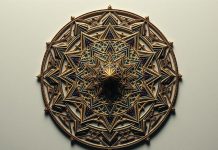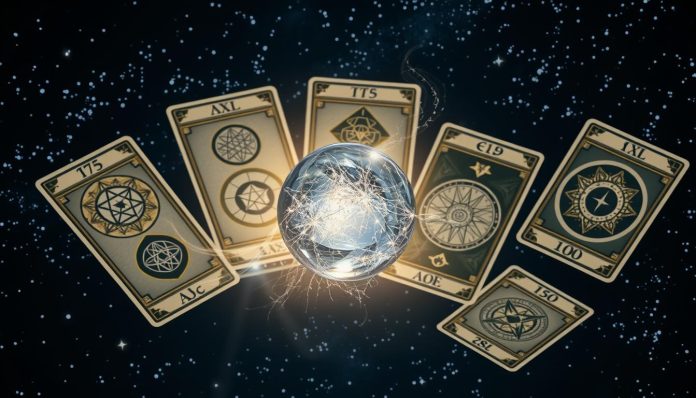Welcome. We invite you into a playful, clear space where images meet numbers. Here we blend ancient numerology with the visual language of tarot cards so readings feel grounded and relatable.
Why this pairing matters. Numbers have long held meaning — from Pythagorean roots to modern life path work. In tarot, many cards carry numeric labels. That link creates a simple map we can follow.
We’ll walk a gentle method: reduce totals to a single number, match that number with archetypes, and watch repeating numbers reveal cycles. This helps with timing, pattern spotting, and personalizing a spread using your own life math.
Expect warm guidance, not hard rules. We honor intuition while giving clear steps that make significance easier to spot. Ready for a small, steady practice that turns each reading into a meaningful map of your path?
Key Takeaways
- Numbers in cards add a clear layer of meaning to readings.
- Reduce totals to single digits to reveal an overall theme.
- Repeating numbers point to timing and cycle awareness.
- Blend personal life path numbers for tailored guidance.
- Use this friendly method often to build trust with symbols.
Introduction: Why combine numerology with tarot readings for deeper guidance
Numbers bring a steady pulse to the visual stories in a spread. This simple connection helps us find pattern and meaning when images feel busy. The math is gentle. The gifts are clear.
What this pairing offers:
- Depth: numerology adds rich number meanings beneath each card image.
- Clarity: a clear numeric anchor makes tarot readings feel less vague.
- Pattern spotting: clusters of a single number reveal cycles like endings or pivots.
- Rapport: blending digits with imagery sharpens our bond with the tarot deck.
“Numbers act as a quiet map—easy to read when emotions run high.”
We treat numbers as gentle guides, not hard rules. Use the cues for timing, story, and practical choices. Your intuition leads; the number is a helpful light on your path.
Tarot numerology explained: the connection between numbers and cards
Numbers act like a steady scaffold beneath the deck’s living images. They give each card a place in a larger pattern and help us read themes across a spread.

How the systems complement one another:
- Why: numerology offers the energetic root of a number.
- How: the card shows the archetypal expression of that root.
- Together, they make interpretation clearer and more consistent.
Roots and the deck’s numbered backbone
In practice, Majors run 0–21 while Minors list 1–10 per suit. That clear structure lets us reduce totals to a single root or treat Minor 10s as cycle markers.
Practical benefits
- Repeated numbers reveal completion or new starts.
- Fixed numeric meanings sharpen timing and accuracy in readings.
- Working with digits deepens our bond with the cards and builds steady wisdom.
Simple habits work well: add, reduce, scan for repeats, then weave the number into the card’s image. Stay flexible—your intuition decides when the number speaks loudest.
Number meanings that power your numerology tarot readings
Let’s map the core energies of each digit so card meanings land fast. This quick guide makes number energy second nature during a reading.
Ones and Twos
1 signals new beginnings: Aces, the Magician, and the Wheel reduced to 1. It’s ignition and personal power.
2 holds balance and duality. Think High Priestess, inner/outer choice, quiet partnership.
Threes and Fours
3 brings creativity and growth. The Empress and related cards sing of nurturing abundance.
4 offers structure and stability. The Emperor grounds projects so ideas can last.
Fives and Sixes
5 marks change and challenge — useful friction that leads to wisdom.
6 returns us to harmony and relationship themes, often seen in Lovers and sixes.
Sevens, Eights, Nines, Tens, and Masters
7 invites introspection and assessment. 8 carries strength, cycles, and manifestation.
9 signals completion and inner wisdom; the Moon and Hermit echo this tone. Minor tens flag a cycle’s end while master numbers 11, 22, 33 amplify insight, building, and service.
“Numbers give a fast map; cards supply the story.”
- Quick tip: watch repeats — they point to a theme worth following.
Prep for success: set up your tarot deck and calculate your core numbers
Before drawing, we gather simple facts and a calm focus. This helps cards and numerology land with clarity.

Find your Life Path, Destiny, and Soul Urge
Life Path comes from your full birth date reduced to a single number or kept as a master number (11, 22, 33).
Destiny uses the Pythagorean chart on your full name. Soul Urge comes from the vowels.
Grounding your practice: intention, shuffling, and choosing a spread
Set an intention and cleanse your tarot deck. Shuffle mindfully and decide if you want a random draw or an intuition-guided selection.
- Decide whether to preserve master numbers for richer meaning.
- Pick a spread that matches the question’s scope.
- Log birth dates and numbers in a notebook so patterns appear over time.
“Shuffle, breathe, ask, draw, add digits, reduce, then map meanings.”
How to Use Tarot and Numerology Together for Deeper Insight
Start by turning totals into a single guiding digit, then let cards tell their story.
Reduce and read: add card values, then reduce to a root number. Treat many 5s as change cycles and lots of 8s as sustained effort.
Map roots to Major and Minor allies
Match roots with a Major ally (1→Magician, 2→High Priestess, 7→Chariot, 9→Hermit) and the pip family in the minor arcana. That pairing gives quick, repeatable meanings for interpretation.
Blend structure with intuition
Let imagery speak first. Use the number to sharpen the card’s tone, not replace your gut. Note exceptions: Minor 10s often mark culminations, while 0 (The Fool) points to open potential.
- Three-step loop: reduce numbers, map Majors/Minors, layer with imagery.
- Scan for repeats to find subplots and timing clues.
- Fold in personal numerology, like Life Path, to see how the spread echoes your path.
“Ask: what action does this number suggest right now?”
Practical spreads: step-by-step examples that reveal number-driven insights
Practical examples make it simple to spot number patterns across a spread. Start small, then scale. We’ll walk three compact trios and show how totals and reductions point toward balance, change, or steady growth.
Three-card flow: relationships, career, spiritual growth
Relationships: 7 of Cups + Hierophant (V) + Ace of Pentacles = 13 → 4. This shows a need for stability despite fresh promise.
Career: Magician (I) + 9 of Swords + Queen of Swords = 10 → 1. A new start energy outweighs fear.
Spiritual growth: Death (XIII) + Queen of Cups + 6 of Cups = 17 → 8. Expect steady strength and soulful release.
Adapting larger spreads
Count majors, add pips, then reduce the total. Circle repeating digits and note suit clusters.
- Count suits: many pentacles signal material themes; many cups signal emotion.
- Circle repeats: repeated number patterns highlight cycles or timing windows.
- Log notes: jot totals, reductions, and one-line meanings in your notebook corner.
Tracking cycles
Flag a “Wheel” moment when totals or repeats point to turning points. Translate that pattern into one clear action step.
“Reduce, read, then pick one practical step that fits the number’s energy.”
Reading patterns, totals, and edge cases like Court cards
When totals and patterns meet, a clear story often emerges from a spread. Start with a simple math flow: add card values, reduce to a root number, then read that root against your question.
Summing a spread: overall totals, reductions, and repeats
Scan for repeats first. Several 5s flag change. Many 7s call for reflection. A root 4 brings practical structure. A root 9 suggests compassionate completion.
- Clean flow: add → reduce → read.
- Spot repeats: they point to timing or theme.
- Minor 10s: can stand as capstones instead of forced reduction.
Court cards and zero: handling non-numbered cards and The Fool’s 0
Courts often sit outside the math. Skip them in totals and read them as roles, tones, or people. That keeps the numeric pulse clear while preserving personality meaning.
The Fool’s 0 acts like fresh air — reset energy and open potential. When 0 appears, treat it as an invitation rather than a numeric endpoint.
“Test both methods: include courts in your totals, then exclude them. Log which feels truer.”
Quick checklist: suit counts, major weight, repeats, overall root. Then translate patterns into one grounded step with real-world power.
Apply the method to life areas: relationships, career, and spiritual growth
Here we map digits onto daily life: romance, work, and inner practice.
Love and relationships. Watch for 2s and 6s. They lean toward balance, shared decisions, and harmony. When a spread carries many 2s, think gentle boundaries and listening. When 6s cluster, compassion and partnership take center stage.
Tip: fold in the High Priestess when intuition or duality feels important. Use Life Path resonance to pace choices gently.
Career and new beginnings
Initiative: 1s and Aces signal new beginnings and bold first steps. Pair creative 3s with steady 4s to keep ideas grounded.
Structure: 4s (Emperor) bring stability. 5s mark change—growth edges that need integration, not rush.
Spiritual growth and intuition
Inner work: 7s ask for soul inventory and reflection. 9s suggest completion, a clearing that frees energy for what’s next.
Momentum: 8s point to long-haul strength and steady manifestation. Let these numbers guide your pacing and practice.

“Translate number patterns into one small, practical step you can take this week.”
| Life Area | Key Numbers | What they mean | Action cheat-sheet |
|---|---|---|---|
| Relationships | 2, 6 | Balance, duality, harmony | Hold one clear boundary; ask one honest question |
| Career | 1, 3, 4, 5 | New beginnings, creativity, stability, change | Take a tiny launch step; pair idea with a weekly plan |
| Spiritual Growth | 7, 8, 9 | Reflection, sustained power, completion | Journal one insight; close one loop; set a steady practice |
- Fold in Life Path to adjust timing and intensity.
- Scan repeats for theme and timing cues.
- Pick one step that matches the number’s tone and try it this week.
Conclusion
Bring this method into a weekly rhythm that reveals slow, steady patterns.
Reduce, map, weave—then trust what your intuition highlights. Log totals and repeats across your tarot cards. Watch how numbers tarot and personal life math point to new beginnings, cycles, or completion.
Keep the High Priestess close as a quiet guide. Let her signal when inner listening matters more than quick fixes. Blend creativity with steady planning. Hold balance and stability as practical goals.
We invite you to try one short weekly reading, note the spread, and track growth along your path. For free tools and easy tracking, visit www.mysticbolt.com and keep exploring with curiosity and care.
Common Questions About Tarot and Numerology?
What does combining numerology with tarot readings add to a session?
How do numbers map onto Major and Minor Arcana?
Which core numerology values should I calculate before a reading?
How do single-digit reductions work in a spread?
What do repeating numbers in a spread signify?
How should I handle Court cards and The Fool (0) in numerology-driven readings?
Can I use this method for timing events like new beginnings or endings?
Are master numbers more powerful in readings?
What practical spreads work best for number-focused sessions?
How do I balance intuition with structured numerology rules?
Can this approach help in decision-making for career or relationships?
How often should I track repeating numbers or cycles in readings?
Where can I find tools that combine both systems?
- Tarotstudio.mysticbolt.com
- Riderwaitetarot.mysticbolt.com
- Crystalencyclopedia.mysticbolt.com
- Crystalmemorygame.mysticbolt.com
- Chakrafrequencytuner.mysticbolt.com
- Tarottoneoracle.mysticbolt.com
- Bubbleteatarot.mysticbolt.com
- Tarotreadinggame.mysticbolt.com
- schumannresonancesspace.mysticbolt.com
- Spiritanimalfinder.mysticbolt.com
- Mystictentcrystalball.mysticbolt.com
- MysticNumerologyApp.mysticbolt.com
- What Is a Birth Chart? A Beginner’s Guide to Your Cosmic BlueprintImagine pausing the sky the moment you were born and turning it into a map. That map is your birth chart—also called a natal chart—a symbolic snapshot of where the Sun, Moon, planets, and angles were from your… Read more: What Is a Birth Chart? A Beginner’s Guide to Your Cosmic Blueprint
- November 2025 Monthly Horoscopes — From Shadow to SparkNovember arrives with the veil thin and the heart awake. We move through deep Scorpio currents into bright Sagittarius fires later in the month, making this a bridge from inner alchemy to outward momentum. It’s a powerful time… Read more: November 2025 Monthly Horoscopes — From Shadow to Spark
- Tarot Card Meanings — Simple Guides for Every Suit | Mystic BoltTarot Card Meanings — Simple, Fast, Memorable Start with Majors for life themes. Then learn suits: Wands for action, Cups for feelings, Swords for thought, and Pentacles for the material world. Numbers add a story beat. Aces spark… Read more: Tarot Card Meanings — Simple Guides for Every Suit | Mystic Bolt
- Online TarotTarot reading online puts clarity a tap away. Open a deck, breathe, and ask one helpful question. Choose a spread that fits your moment. Keep the tone curious and kind. Let symbols spark insight, not anxiety. Start with… Read more: Online Tarot
- Free Tarot Reading — Instant Online SpreadsFree tarot reading tools are here for quick insight and calm. Shuffle, tap, and reveal guidance in seconds. You bring the question. The cards bring the conversation. Keep it light, playful, and focused. Let’s read. How to get… Read more: Free Tarot Reading — Instant Online Spreads




